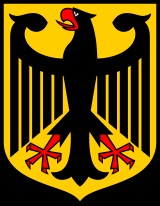Federal Republic of Germany: Difference between revisions
No edit summary |
No edit summary |
||
| Line 21: | Line 21: | ||
|religion=Atheist, Catcholic | |religion=Atheist, Catcholic | ||
|provinces=1 | |provinces=1 | ||
|constitution=Grundgesetz für die Bundesrepublik Deutschland}} | |constitution=Grundgesetz für die Bundesrepublik Deutschland | ||
}}'''Germany''', officially the '''Federal Republic of Germany''', is a country in the western region of Central Europe. | |||
'''Germany''', officially the '''Federal Republic of Germany''', is a country in the western region of Central Europe. | |||
== Etymology == | == Etymology == | ||
The English word ''Germany'' derives from the Latin ''Germania'', which came into use after Julius Caesar adopted it for the peoples east of the Rhine. The German term ''Deutschland'', originally ''diutisciu land'' ('the German lands') is derived from ''deutsch'' (cf. ''Dutch''), descended from Old High German ''diutisc'' 'of the people' (from ''diot'' or ''diota'' 'people'), originally used to distinguish the language of the common people from Latin and its Romance descendants. This in turn descends from Proto-Germanic *''þiudiskaz'' 'of the people' (see also the Latinised form ''Theodiscus''), derived from *''þeudō'', descended from Proto-Indo-European *''tewtéh₂-'' 'people', from which the word ''Teutons'' also originates. | The English word ''Germany'' derives from the Latin ''Germania'', which came into use after Julius Caesar adopted it for the peoples east of the Rhine. The German term ''Deutschland'', originally ''diutisciu land'' ('the German lands') is derived from ''deutsch'' (cf. ''Dutch''), descended from Old High German ''diutisc'' 'of the people' (from ''diot'' or ''diota'' 'people'), originally used to distinguish the language of the common people from Latin and its Romance descendants. This in turn descends from Proto-Germanic *''þiudiskaz'' 'of the people' (see also the Latinised form ''Theodiscus''), derived from *''þeudō'', descended from Proto-Indo-European *''tewtéh₂-'' 'people', from which the word ''Teutons'' also originates. | ||
Revision as of 15:46, 23 March 2024
Germany, officially the Federal Republic of Germany, is a country in the western region of Central Europe.
Etymology
The English word Germany derives from the Latin Germania, which came into use after Julius Caesar adopted it for the peoples east of the Rhine. The German term Deutschland, originally diutisciu land ('the German lands') is derived from deutsch (cf. Dutch), descended from Old High German diutisc 'of the people' (from diot or diota 'people'), originally used to distinguish the language of the common people from Latin and its Romance descendants. This in turn descends from Proto-Germanic *þiudiskaz 'of the people' (see also the Latinised form Theodiscus), derived from *þeudō, descended from Proto-Indo-European *tewtéh₂- 'people', from which the word Teutons also originates.

